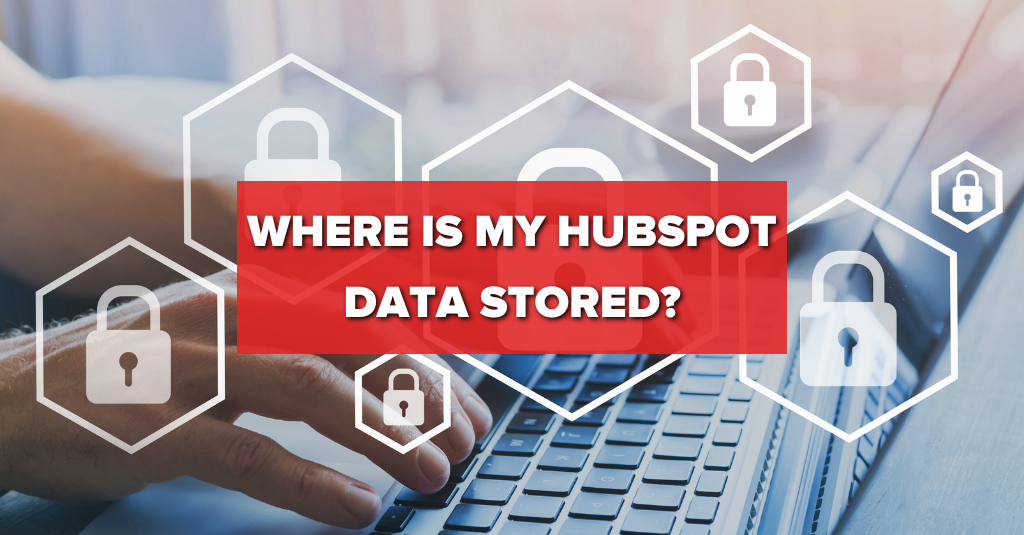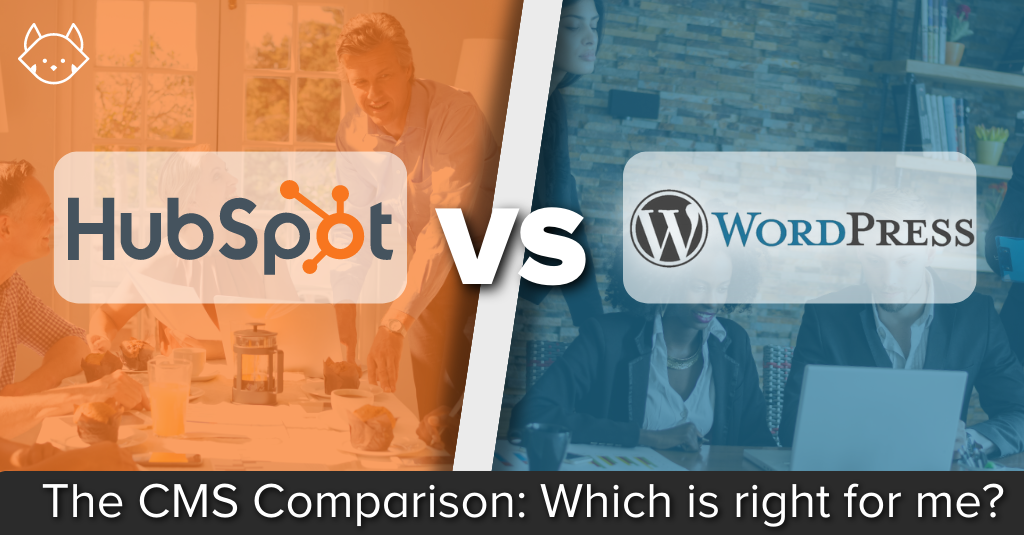According to recent studies, 43% of all cyber attacks target small businesses. This is an alarming statistic, and it highlights the importance of data security for businesses of all sizes. In today’s digital age, cyber-attacks have become increasingly common and sophisticated. Many businesses are vulnerable to these attacks, and the consequences can be devastating. Let’s take a closer look at HubSpot’s data storage and security measures.
As a HubSpot user, it’s crucial to understand where your data is stored and how secure it is so that you can be sure your data is safe. HubSpot is a powerful tool for managing your customer data and streamlining your marketing and sales processes. However, it’s also a target for cyber criminals who are looking to steal valuable data. This is why it’s important to have a solid understanding of HubSpot’s security measures and data storage policies. In fact, we recommend making sure you’re up to date with the security measures being used to protect your data on any service provider you give your information to.

In this article, you’ll learn about the benefits of using HubSpot for your business, as well as some of the potential risks and downsides. We’ll also discuss how HubSpot compares to other popular platforms like Salesforce and WordPress. By the end of this article, you’ll have a better understanding of how to protect your business from cyber threats and keep your valuable data safe.
In particular, we’re going to cover:
Consequences of Unsafe Data Protection
The consequences of inadequate data protection can be significant for both businesses and individuals. Let’s look at both sides.
Consequences for businesses
If you fail to comply with data protection laws, you could face fines, lawsuits, and reputational damage.
“The Privacy Act 1988 (Privacy Act) is the principal piece of Australian legislation protecting the handling of personal information about individuals. This includes the collection, use, storage and disclosure of personal information in the federal public sector and in the private sector.”
Australian Government – Attorney-General’s Department
In particular, the privacy act states that it is illegal to store someone’s data without informing them or without ensuring its safety. Data breaches due to inadequate security measures may result in hefty fines and legal action.
However, beyond the legal consequences, it’s also a matter of building trust with your customers. When you build digital trust, you are ultimately being transparent with your customers, which builds loyalty and positions you as their trusted advisor. Ultimately, customers are more likely to make purchases from companies that they trust.
In fact, a recent research study indicated that organisations that are best positioned to build digital trust are also more likely than others to see annual growth rates of at least 10 percent on their top and bottom lines (McKinsey).

By being transparent about their data policies, businesses are able to show customers that they have strong security measures in place, and this in turn leads to customer loyalty. However, the consequence of lacking transparency around this and/or not having strong security measures in place are an enormous loss in customer loyalty, which ultimately impacts revenue.
As we can see, besides the legal consequences, data security has an enormous impact on customer loyalty and revenue.
Consequences for Individuals

Data breaches can have severe consequences for individuals whose personal information has been compromised. Some of the potential consequences include:
- Identity theft: When personal information is stolen, cybercriminals can use it to commit identity theft. They can use the stolen data to open new accounts, take out loans, and make unauthorised purchases.
- Financial loss: A data breach can lead to financial loss for individuals whose bank account or credit card information has been compromised.
- Reputation damage: If personal information is leaked, individuals may suffer damage to their reputation. This can be particularly damaging for professionals or public figures.
- Emotional distress: A data breach can cause emotional distress and anxiety for individuals whose personal information has been stolen. This can lead to feelings of vulnerability and a loss of trust in organisations that handle personal data.
Aside from this, there are also ethical consequences to take into account. For example, if a Men’s Sexual Health business doesn’t have adequate data security in place, and their data is breached, sensitive and private information about their client’s lives becomes accessible to hackers. In this case, data protection is more than just about safety – it’s also about protecting people’s dignity. As such, from some points of view, it can be unethical to have unsafe data protection in place when managing private information about individuals.
Where is my HubSpot Data Stored and How Safe is it?
As of July 2021, HubSpot’s product infrastructure is hosted on Amazon Web Services (AWS) in the United States East region or in the Germany region. This is a significant change from prior to July 2021 when HubSpot’s AWS environment was solely located in the United States.
So why did HubSpot choose to host in the United States and Germany?
The company has not provided a specific answer to this question, but it is likely that they chose these locations for their robust infrastructure and data protection laws. Germany, in particular, is known for having some of the strongest data protection laws in the world. Additionally, AWS is one of the biggest web server services out there, which provides additional security and scalability for HubSpot’s platform.
It’s worth noting that HubSpot also supports regional data hosting, which means that your data can be hosted in a location closer to your physical location. This is important for businesses that may have data sovereignty laws they need to adhere to, as well as for improving the performance and speed of HubSpot’s platform for users.
Overall, knowing where your data is stored and why it’s stored there is an important step in protecting your business and complying with data protection laws. HubSpot’s choice to host with AWS in the United States and Germany provides a strong foundation for their security measures, and their support for regional data hosting offers additional flexibility for businesses.
Pros and cons of HubSpot’s data protection practices
While HubSpot provides transparency and openness in its data protection and security policies, there are still potential downsides to hosting your data with them. Let’s take a closer look at the benefits and downsides of hosting your data with HubSpot.
Pros
“In the seven years that I’ve used HubSpot as an end-user, I’ve never seen it have any security breaches”.
– Tasha Dal Blanco, HubSpot Specialist at RedPandas
- Transparency: HubSpot is very transparent about its data protection and security policies, which is reassuring to customers who are concerned about the safety of their data. HubSpot has never withheld information and that is a huge benefit form an end user’s point of view because they feel confident that should anything happen, HubSpot will tell them. Remember – transparency builds trust, and trust builds loyal customers.
- Reliability: HubSpot’s uptime and performance have been impressive, with no major security breaches in the last seven years.
- Regional hosting: HubSpot offers regional data hosting, which can be an advantage for companies with specific data storage requirements.
Cons
The only real downside we could find is that when hosting data with HubSpot, you are entrusting the safety of your data to a third party, which means you have limited control over your data’s protection. In saying this, this limited control is something that exists regardless of which third party business you choose to handle your data.
Ultimately, the decision to host data with HubSpot depends on a variety of factors, including the size and needs of your business, your budget, and your level of trust in third-party data hosting services. It’s important to weigh the benefits and downsides carefully before deciding.
Potential problems that could arise with HubSpot’s data setup
Despite HubSpot’s efforts to maintain a secure data environment, there is always a possibility of data breaches and hacking attempts with any technology you use today, and that’s probably never going to change.
While HubSpot has implemented security measures to prevent and mitigate data breaches, it’s important to be aware of potential risks and to take additional steps to protect your data. This includes regularly updating passwords, implementing two-factor authentication, and limiting access to sensitive information.
In the event of a breach, transparency and quick response are crucial. HubSpot’s commitment to transparency is a positive sign that they take data security seriously, so even in the face of potential risk, you can be sure that HubSpot has your back.
How does HubSpot’s Security Measures Compare to Other Platforms
From a CRM perspective, Salesforce is probably the best alternative to HubSpot, and from a CMS perspective, WordPress is the best alternative. Let’s look at how these two platforms measure up in data security.
Salesforce’s data security measures
At Salesforce, trust is our #1 value, and our data center strategy supports the company’s commitment to run the most secure, trusted, reliable, and available cloud computing service. To that end, we build and serve each Salesforce instance from multiple geographically diverse data centers to avoid single points of failure in our infrastructure. This design supports the continuous availability our customers have come to expect from us.
Salesforce 2023
Salesforce is a powerful platform with robust security features, including encryption and access control. It also offers regional data hosting, like HubSpot. Ultimately, Salesforce’s data protection measures aren’t going to let you down.
In saying that, you might want to compare Salesforce and HubSpot on other features and pricing packages to find out what’s right for your business.
WordPress
WordPress uses MySQL as its database management system, which is a software installed on your WordPress hosting server. When you use WordPress as a CMS, you have to choose a hosting provider to store your data. Some examples include:

As such, you’ll need to check where your hosting provider stores your data and how they protect your data.
On top of this, there are also other data security risks associated with using WordPress as your CMS.
One of the key risks associated with WordPress is outdated software. If you do not update your WordPress installation or any plugins or themes you use, you may be leaving your website vulnerable to security breaches. It is important to stay up to date with the latest security updates and patches to keep your website secure. This requires manual work to maintain and update and may therefore become more costly to maintain as you need to hire an expert to keep everything safe and up to date.
Another risk is third-party plugins and themes. These can sometimes contain vulnerabilities or malicious code that can be exploited by hackers. It is important to only use trusted plugins and themes from reputable sources and to keep them updated.
When it comes down to it, WordPress is far more vulnerable and less secure than HubSpot and Salesforce in terms of data security. On top of this, depending on the hosting provider you choose to use with WordPress, your data security may become more or less secure.
So, what’s next?
You can rest assured that HubSpot’s data security practices are strong and that your data is safe with them. On top of that, because of their transparency, you’ll be the first to know if the worst case scenario happens and your data is breached.
We’ve written many articles comparing different software, and we usually compare by price and features, however, it’s becoming increasingly important to also consider data security. That’s why, when you’re picking software to use for your business, make sure you make this one of your main consideration points.













